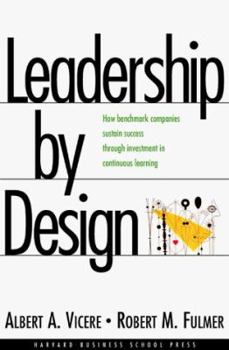Leadership by Design
With an emphasis on real-world tools and guidelines, this text presents a comprehensive review of late-1990s thinking on leadership and of the major literature on leadership development.
Format:Hardcover
Language:English
ISBN:0875848311
ISBN13:9780875848310
Release Date:May 1998
Publisher:Harvard Business Review Press
Length:337 Pages
Weight:1.50 lbs.
Dimensions:1.3" x 6.5" x 9.5"
Customer Reviews
1 rating
Strategic Leadership Development Process
Published by Thriftbooks.com User , 24 years ago
"In today's changing business environment, traditional processes for developing leadership talent are in such a state of flux that a new vocabulary is emerging."Albert A. Vicere and Robert M. Fulmer write, "There is a little interest in the old mainstay term 'management development'. Managers today are often viewed as bureaucrats whose major function is to create complexity and preserve the status quo. 'Executive education' is a more desirable term, but in today's flatter, more networked organizations, there is a less demand for 'executives', often viewed as aloof and removed from the realities of the competitive marketplace. And the word 'education' connotes the esoteric contemplation of academic issues, a process at odds with today's fast-paced business environment. There does seem to be great interest in the term 'leadership development', which characterizes processes for identifying and developing exceptional people capable of moving an organization into the twenty-first century. Although developing tomorrow's leaders is a critical concern for most organizations, equally important is the need to create new structures and processes that will enable the organization to effectively compete in a rapidly changing, global economy. Rather than viewing these two concerns as separate challenges, benchmark organizations from around the world have begun to combine them in an expanded developmental focus which we call 'strategic leadership development'.This focus blends traditional executive education activities with management, leadership, and organizational development techniques to create hands-on, real-time learning laboratories within organizations, which facilitate concontinuous learning, continuous knowledge creation, and organizational competitiveness. This book focuses on the challenge of strategic leadership development-what it is, how it arose and is evolving, and how it is being addressed today" (from the Preface).In this context, Albert A. Vicere and Robert M. Fulmer :* discuss several critical ideas that are fundamental to their thinking, including the nature of strategic leadership and the concept of a learning organization.* describe the traditional paradigm for leadership development, and discuss today's challenges to this traditional way of thinking, and hence describe how organizations are refocusing their leadership development efforts to better develop their pool of strategic leadership talent.* discuss how strategically focused leadership development processes can help build sustainable organizational competitiveness.* discuss the nature of new paradigm for effective organizations, how it operates, and how it relates to the evolving approaches to leadership development.* present a systems model for strategic leadership development to illustrate the major forces shaping the behaviors and outcomes within the field.* discuss the nature of various techniques and methodologies for leadership develop





